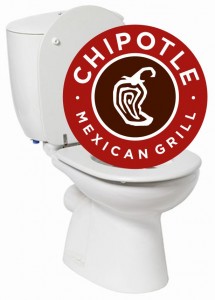 The Chipotle brand failure brand gives new meaning to a brand backfire with 30 more people reported sick in Boston today. It turns out, the “food with integrity” branding idea looks better in the advertising than it does in reality.
The Chipotle brand failure brand gives new meaning to a brand backfire with 30 more people reported sick in Boston today. It turns out, the “food with integrity” branding idea looks better in the advertising than it does in reality.
“Aspirational branding” is a ticking time bomb
Building a brand about what you want to be rather than what you opens the door to catastrophic brand failure. Dressing a brand in pretty design and heart-lifting words is easy. Operational realities can often make it impossible to deliver on the aspirational promise. (see BP’s “Beyond Petroleum” claim)
Restaurants battle e. coli all the time and are a leading source of food-borne illnesses (some restaurant food poisoning stats for you). Wendy’s, McDonald’s, Subway* and others have survived outbreaks, yet Chipotle’s brand is taking a serious dive.
Chipotle brand failure: Not delivering on integrity promise
The problem is Chipotle has built is brand on “food with integrity,” and now it can’t deliver. Sales are falling for the first time in company history and share prices are sinking fast. Here is a short list of “food with integrity” Chipotle brand failure examples:
- Traceable Ingredients: Chipotle says it can trace every ingredient from farm to table in real time with software from FoodLogiQ. How can that claim be true, when a month and a half into the Chipotle e. coli outbreak, they still haven’t discovered the contamination source and customers are still getting sick?
- Local Sourcing: This brand “stretch” that has proven to be a stretcher. Chipotle says: “The less distance food has to travel the better,” yet many of its ingredients are sent through centralized facilities in Chicago run by companies such as OSI or Miniat before shipping to restaurants. Chipotle’s “grass-fed beef” comes from Australia. That puts a lot of miles on your burrito bowl! The company recently removed the claim, “We serve more local produce than any restaurant company in the US” from its Web site.
- PR Spin: Chipotle spokesman Chris Arnold announced: “There are no confirmed cases of E. coli connected to Chipotle in Massachusetts.” Yet it temporarily closed it’s the Boston restaurant where some thirty people fell ill this weekend. It closed 43 stores in nine other states, but in Boston, there were no confirmed cases of e. coli?
- No GMO Food: Chipotle ballyhooed is ban on genetically modified ingredients in a move some called bold and others saw as a cynical appeal to customer fear. Either way, with nearly 70 ingredients in a single burrito, eliminating GMO foods is nearly impossible. Chipotle’s meat comes from animals that eat genetically modified food and such ingredients “lurk in baking powder, cornstarch, and a variety of ingredients used as preservatives, coloring agents, and added vitamins, as well as in commodities like canola and soy oils, corn meal, and sugar,” according to the New York Times. Chipotle takes an anti-GMO stance in the name of health while lading out 1,600 calories of salt-laden food per meal.
When a brand makes integrity a central promise, it better be absolutely certain to delivery. If not, it can very dramatically backfire–like the Chipotle brand failure.
* I have done branding work with Subway in the past.
